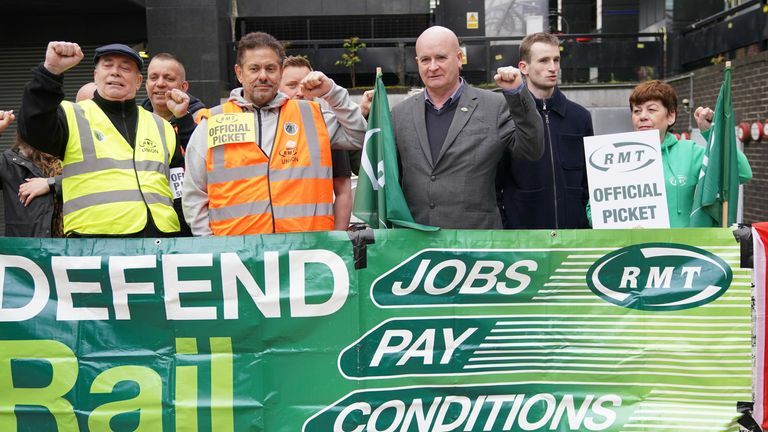Rail union boss claims strikes successful despite ongoing pay dispute

The general secretary of the Rail, Maritime and Transport (RMT) union, Mick Lynch, has declared the ongoing rail strikes in the UK a “success,” despite the lack of an agreed pay deal after nearly a year of industrial action. Lynch stated that the strikes, which commenced in June 2022, have successfully prevented management from implementing redundancies and controversial reforms such as widespread ticket office closures. He also claimed that the union’s actions have inspired workers in other sectors.
On Friday, around 20,000 workers from 14 firms, including guards and rail managers, participated in another walkout over pay and conditions, causing significant disruption. Train drivers’ union ASLEF also held a walkout on Wednesday, with more action planned for the weekend as part of the ongoing dispute between the government and the unions.
Lynch, speaking from a picket line at London’s Euston station, blamed train companies for the disruption and said strikes would cease as soon as a “fair” deal was agreed. He argued that the action had already produced results, as railway firms “haven’t been able to implement any of their plans.”
“We’ve pushed them [rail bosses] back on all the stuff they wanted to do – they wanted to make thousands of our people redundant, they wanted to shut every booking office in Britain, restructure our engineering workers, [and] cut the catering service,” Lynch said. “What we haven’t got is a pay deal, we haven’t got any guarantees on our members’ futures, but we have stopped them doing the worst aspects of their proposals and their ideas.”
Lynch added that the strikes have been successful, with members continuing to support the action through three ballots. He also noted that the strikes have inspired others to take action in their industries and put trade unions back on the map in Britain.
However, the RMT and ASLEF have rejected pay offers made by the government this year, arguing that the proposed terms on conditions and pay are insufficient, especially given the ongoing high inflation. Some disputes have been resolved, such as a separate row involving RMT workers at Network Rail, who voted to accept a revised pay offer in March.
A spokesperson for the Rail Delivery Group (RDG), representing the UK’s train service providers, countered the RMT’s claims, stating that “common-sense” reforms are “long overdue.” They said, “There have been three pay deals offered which the RMT executive have reneged despite their negotiators in the room agreeing the terms.”
The RDG also argued that the RMT has only succeeded in taking money from their members’ pockets, causing misery for thousands of people and damaging an industry crucial to Britain’s economy and their members’ livelihoods.
Latest Thailand News
Follow The Thaiger on Google News:


























